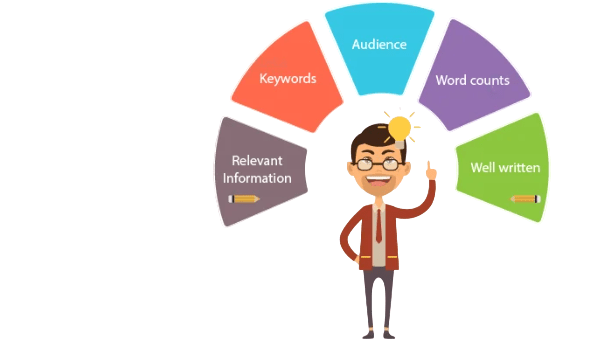
- What Is SEO Content Writing?
- Why SEO Content Writing Matters
- Key Elements of SEO Content Writing
- How to Write SEO Content Step-by-Step
- Common SEO Content Writing Mistakes to Avoid
- Measuring SEO Content Success
- Advanced SEO Content Strategies
- Tools and Resources for SEO Content Writers
- Conclusion
What Is SEO Content Writing?
SEO content writing is the process of creating high-quality, informative, and engaging content that is optimized to rank well in search engine results pages (SERPs). The goal is to attract organic (non-paid) traffic by targeting specific keywords and phrases that people are actively searching for.Unlike general writing, Digital Marketing Training , SEO content writing focuses on both readability for users and visibility for search engines. This involves using relevant keywords naturally, writing compelling meta titles and descriptions, Advanced SEO Content Strategies, using headers and subheaders (H1, H2, etc.), and ensuring the content is well-structured, mobile-friendly, and easy to navigate.
Good SEO content should:
- Answer user search intent clearly and effectively.
- Be original, useful, and valuable.
- Include strategic internal and external links.
- Use keywords in titles, subheadings, and throughout the text without overstuffing.
- Be updated regularly to remain relevant.
Examples of SEO content include blog posts, landing pages, product descriptions, guides, FAQs, and more. Ultimately, the goal of SEO content writing is to improve a website’s visibility in search engines while delivering a great experience for the reader.
Ready to Get Certified in Digital Marketing? Explore the Program Now Digital Marketing Online Training Offered By ACTE Right Now!
Why SEO Content Writing Matters
In 2025, organic search will remain one of the most cost-effective and high-intent sources of website traffic. Research shows that over 70% of online experiences begin with a search engine, SEO Content Writing Matters and websites ranking on the first page capture the majority of clicks.

Well-written SEO content attracts organic traffic, which is both free and sustainable over time. Unlike paid advertising, which stops delivering results once the budget runs out, SEO content continues to drive visitors long after it’s published. This makes it a cost-effective way to grow your audience and customer base.SEO content also builds credibility and trust. When your content ranks highly, users are more likely to view your site as an authority in your field. It helps answer their questions, solve problems, and guide them through their decision-making process.In addition, SEO content improves user experience. Clear structure, relevant keywords, Google’s Match Type Changes , engaging writing, and helpful information all contribute to keeping visitors on your site longer and encouraging them to take action.In short, SEO content writing is a powerful tool that boosts visibility, drives traffic, and supports your overall marketing and business goals.
Key Elements of SEO Content Writing
- Keyword Research: The foundation of SEO content writing is understanding what your audience searches for. Keyword research helps identify high-value terms and phrases with search volume and achievable competition.Consider search intent (informational, transactional, navigational) and use tools like Google Keyword Planner, Digital Marketing Training , Ahrefs, SEMrush, or free alternatives to discover relevant keywords.
- Content Structure: Proper content structure improves readability and search engine crawlability. Use.Headings and subheadings (H1, H2, H3…) to organize content.Short paragraphs and bullet points for easier scanning.Clear introduction and conclusion to frame the topic.
- Readability and User Experience: Search engines favor content that users can easily read and understand. Write in clear, concise language, avoid jargon, and aim for a reading level appropriate to your audience.
- Title tags and meta descriptions with primary keywords.
- URLs to be descriptive and concise.
- Alt text for images.
- Internal linking to related pages.
- Use of synonyms and related terms (semantic SEO).
- Topic Selection: Choose topics based on keyword research and audience needs. Look for gaps in existing content, trending subjects, Inbound Marketing or questions your audience frequently asks.
- Keyword Integration: Place keywords naturally within titles, headings, body text, and meta tags. Avoid keyword stuffing overuse can harm rankings.
- Crafting Headlines and Meta Tags: Create compelling headlines that include target keywords and entice clicks. Write meta descriptions summarizing the content and encouraging users to visit.
- Writing the Body Content: Deliver on your headline’s promise. Provide in-depth information, answer questions, and maintain a logical flow.
- Optimizing Images and Media: Include relevant images, videos, infographics with optimized alt text and file names to enhance SEO and user experience.
- Adding Internal and External Links: Link to other relevant pages on your site to keep users engaged and improve site architecture. Use authoritative external links to support your claims and add value.
- Define Clear Goals: Increase followers, boost engagement, drive website traffic, or generate leads.
- Know Your Audience: Use analytics to understand demographics, interests, and behavior.
- Choose the Right Platforms: Focus your efforts where your audience spends the most time.
- Create a Content Calendar: Plan posts around key dates, campaigns, Types of Content Marketing and audience preferences.
- Optimize Profiles and Content: As detailed above.
- Engage Actively: Respond to comments and messages, and foster conversations.
- Monitor Results and Adjust: Track KPIs and tweak your strategy accordingly.
- Organic Traffic: The number of visitors coming to your site from search engines shows how visible your content is.
- Keyword Rankings: Monitoring how your targeted keywords rank over time helps assess if your optimization efforts are working.
- Bounce Rate: A high bounce rate may indicate that visitors aren’t finding what they expected, suggesting content or user experience issues.
- Average Session Duration: Longer time spent on your page generally means users find your content valuable and engaging.
- Pages per Session: Indicates how many pages a user visits during a single session; Display Advertising more pages suggest good internal linking and interest.
- Conversions and Goals: Tracking actions like sign-ups, purchases, or downloads reveals how effectively your content drives business objectives.
- Backlinks: Quality backlinks show that other sites find your content valuable, which boosts your SEO authority.Measuring SEO Content Success.
- Social Shares and Engagement: While indirect, these can indicate how well your content resonates with your audience.
- Topic Clusters and Pillar Pages: Create comprehensive pillar pages around broad topics with clusters of related subtopics. This builds authority and improves internal linking.
- Voice Search Optimization: Write conversationally, using natural language, Video Marketing and questions to capture voice search queries.
- Semantic SEO and LSI Keywords: Incorporate synonyms and related terms to help search engines understand context.
- Content Refresh and Updating: Regularly update content to keep it relevant and maintain rankings.
- Google Keyword Planner.
- Ahrefs, SEMrush.
- Grammarly and Hemingway Editor (for readability).
- Google Analytics and Search Console.
- Yoast SEO or Rank Math (WordPress plugins).
- SurferSEO or Clearscope (content optimization tools).
On-Page SEO Factors
To Explore Digital Marketing in Depth, Check Out Our Comprehensive Digital Marketing Training To Gain Insights From Our Experts!
How to Write SEO Content Step-by-Step
Common SEO Content Writing Mistakes to Avoid
Although SEO content writing is an effective tool, many writers make typical blunders that can lower user interest and search rankings. One common error is keyword stuffing, which involves overusing terms in content in an unnatural way. This can cause reading issues and can result in search engine penalties. Ignoring search intent is another common mistake. Writing off-topic or superficial content results in high bounce rates and low ranks; content should be in line with what users are truly searching for. Additionally, some writers neglect on-page SEO elements like meta titles, descriptions, header tags, Benefits of being a Content Marketer and image alt text, all of which help search engines understand and index content properly. SEO can also be harmed by thin or poor-quality content pages that contain little useful information, especially if the same content appears across multiple pages (duplicate content). Poor internal linking is another overlooked mistake; without it, users and search engines struggle to navigate your site. Lastly, failing to optimize for mobile and page speed can reduce user satisfaction and lower rankings. Avoiding these mistakes ensures your content is both user-friendly and search engine-friendly, helping you attract more organic traffic and maintain a strong online presence.
Looking to Master Digital Marketing? Discover the Digital Marketing Expert Masters Program Training Course Available at ACTE Now!
How to Develop an Effective SMO Strategy
Measuring SEO Content Success
Measuring SEO Content Success content is crucial to understand how well it’s performing and where improvements are needed. Key metrics to track include:

Using tools like Google Analytics, Google Search Console, and SEO platforms (e.g., Ahrefs, SEMrush) can help you monitor these metrics and make data-driven improvements to your SEO content strategy.
Advanced SEO Content Strategies
Preparing for Digital Marketing Job Interviews? Have a Look at Our Blog on Digital Marketing Interview Questions and Answers To Ace Your Interview!
Tools and Resources for SEO Content Writers
Conclusion
SEO content writing is evolving with advancements in AI, voice search, Content Strategies , Advanced SEO Content Strategies and user behavior analysis. Writers must blend creativity with data-driven strategies to craft content that resonates with users and algorithms alike.Investing in quality SEO Content Success, Digital Marketing Training Measuring SEO Content Success is one of the smartest moves businesses can make to build organic presence and drive meaningful results in a crowded digital landscape.




